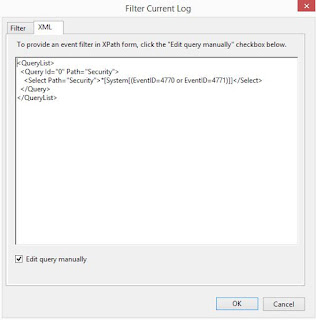Get-WmiObject -Class Win32_Volume | Select-Object Name, Label, BlockSize
Get-CimInstance -ClassName Win32_Volume | Select-Object Name, Label, BlockSize
25 May 2018
Find filesystem blocksize on windows with powershell
22 May 2018
Find exception full name
$Error[0] | Select-Object *
Exception : Microsoft.ActiveDirectory.Management.ADIdentityAlreadyExistsException: The specified account already exists
$Error[0].Exception.GetType().FullName
Microsoft.ActiveDirectory.Management.ADIdentityAlreadyExistsException
Exception : Microsoft.ActiveDirectory.Management.ADIdentityAlreadyExistsException: The specified account already exists
$Error[0].Exception.GetType().FullName
Microsoft.ActiveDirectory.Management.ADIdentityAlreadyExistsException
14 March 2018
Exchange 2016 cmdlet help
help is broken in Exchange 2016 PowerShell console - the only way to make it work i found to be this:
$Session = New-PSSession -ConfigurationName
Microsoft.Exchange
-ConnectionUri http://exchangeservername/PowerShell/?SerializationLevel=None
Invoke-Command –Session $Session –ScriptBlock {Get-Help
Get-Mailbox}
but you will not be abble to import the exchange cmdles through this pssession because it will throw an error.
to import the cmdlest you need to have a different pssession without "SerializationLevel=None"
$Session2 = New-PSSession -ConfigurationName
Microsoft.Exchange
-ConnectionUri http://exton.office.orange.intra/PowerShell
Import-PSSession $Session2
02 March 2018
Get-WmiObject hangs
for some reason Get-WmiObject hangs on some of the computers that is queryes and the powershell console must be restarted.
in order to overcome this problem a used "-AsJob" parameter
$Job = Get-WmiObject -Class win32_computersystem -AsJob -ComputerName ServerName | Wait-Job -Timeout 30
$Result = $Job | Receive-Job
in order to overcome this problem a used "-AsJob" parameter
$Job = Get-WmiObject -Class win32_computersystem -AsJob -ComputerName ServerName | Wait-Job -Timeout 30
$Result = $Job | Receive-Job
27 January 2018
Protect OU (Organizational Unit) in AD from accidental deletion
to verify if your OUs are protected from accidental deletion use:
Get-ADOrganizationalUnit -Filter * -Properties * |Select-Object DistinguishedName, ProtectedFromAccidentalDeletion
to protect all OUs in AD from accidental deletion use:
Get-ADOrganizationalUnit -Filter * | Set-ADObject -ProtectedFromAccidentalDeletion:$true
Get-ADOrganizationalUnit -Filter * -Properties * |Select-Object DistinguishedName, ProtectedFromAccidentalDeletion
to protect all OUs in AD from accidental deletion use:
Get-ADOrganizationalUnit -Filter * | Set-ADObject -ProtectedFromAccidentalDeletion:$true
Find FSMO roles from powershell
Get-ADDomainController -Filter * | Select-Object Name, Site, OperatingSystem, OperationMasterRoles
21 January 2018
Search eventlogs with xml filter
# 4625 bad password in client log
# 4771 bad password in DC log
# 4740 lockout in DC log
# <Select Path="Security">*[System[(EventID=4740 or EventID=4771)]]</Select>
[xml]$XMLFilter = @"
<QueryList>
<Query Id="0" Path="Security">
<Select Path="Security">*[System[(EventID=4740)]]</Select>
</Query>
</QueryList>
"@
$AllDomainControllers = Get-ADDomainController -Filter *
$AllEvents = @()
foreach($DC in $AllDomainControllers){
$Events = @()
$Events += Get-WinEvent -FilterXml $XMLFilter -ComputerName $DC.HostName -ErrorAction SilentlyContinue
$AllEvents += $Events
$DC.HostName + ' ' + $Events.Length
}
foreach($Event in $AllEvents){
$EventXMLData = [xml]$Event.ToXml()
for($i=0; $i -lt $EventXMLData.Event.EventData.Data.Count; $i++){
$Name = $EventXMLData.Event.EventData.Data[$i].Name
$Value = $EventXMLData.Event.EventData.Data[$i].'#text'
Add-Member -InputObject $Event -MemberType NoteProperty -Force -Name $Name -Value $Value
}
}
$AllEvents |
Select-Object TargetUsername, MachineName, TimeCreated,IpAddress, ID |
Format-Table
# 4771 bad password in DC log
# 4740 lockout in DC log
# <Select Path="Security">*[System[(EventID=4740 or EventID=4771)]]</Select>
[xml]$XMLFilter = @"
<QueryList>
<Query Id="0" Path="Security">
<Select Path="Security">*[System[(EventID=4740)]]</Select>
</Query>
</QueryList>
"@
$AllDomainControllers = Get-ADDomainController -Filter *
$AllEvents = @()
foreach($DC in $AllDomainControllers){
$Events = @()
$Events += Get-WinEvent -FilterXml $XMLFilter -ComputerName $DC.HostName -ErrorAction SilentlyContinue
$AllEvents += $Events
$DC.HostName + ' ' + $Events.Length
}
foreach($Event in $AllEvents){
$EventXMLData = [xml]$Event.ToXml()
for($i=0; $i -lt $EventXMLData.Event.EventData.Data.Count; $i++){
$Name = $EventXMLData.Event.EventData.Data[$i].Name
$Value = $EventXMLData.Event.EventData.Data[$i].'#text'
Add-Member -InputObject $Event -MemberType NoteProperty -Force -Name $Name -Value $Value
}
}
$AllEvents |
Select-Object TargetUsername, MachineName, TimeCreated,IpAddress, ID |
Format-Table
Active directory domain user last logon date and time
"lastLogon" attribute is per domain controller - is not replicated to other domain controllers in the domain and each domain cotroller has his own information.
"lastLogonTimeStamp" is replicated in the domain (all domain controllers have the same updated information).
the date is stored in 100 miliseconds interval since 01.01.1601 (Juanuary 1, 1601)
to convert from System.Int64 we can use "FromFileTime" static method of DateTime class:
[System.DateTime]::FromFileTime($ADUser.lastlogon)
[System.DateTime]::FromFileTime($ADUser.lastlogontimestamp)
http://msdn.microsoft.com/en-us/library/ms676824(VS.85).aspx
http://msdn.microsoft.com/en-us/library/ms676823(VS.85).aspx
Active Directory Technical Specification
search the web for "MS-ADTS"
https://msdn.microsoft.com/en-us/library/cc223122.aspx
List active directory group membership changes
$ADGroup = Get-ADGroup -Identity 'Domain Admins'
Get-ADReplicationAttributeMetadata -Object $ADGroup.DistinguishedName -Server dc1 -ShowAllLinkedValues
in the output the "AttributeName" is the attribute that was changed - we should search for the "member" attribute.
"AttributeValue" is the value assigned to the attribute.
"FirstOriginatingCreateTime" is the time the value was added.
"LastOriginatingDeleteTime" is the time the value was deleted - but only if is different from "1/1/1601 2:00:00 AM"
Subscribe to:
Posts (Atom)

